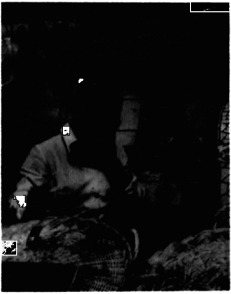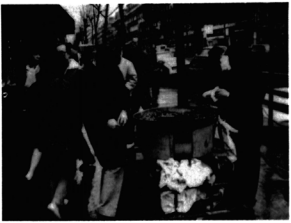16.3: CROIRE, to believe, to think
- Page ID
- 142367
CROIRE, to believe, to think
| Je crois que oui. | I think so. |
| Tu crois qu'il est fou? | You think he's crazy? |
| Elle croit en Dieu. | She believes in God. |
| Nous croyons à ses promesses. | We trust his promises. |
| Vous croyez ça? | Do you believe that? |
| Ils croient que non. | They don't think so. |
| Passé composé: j'ai cru, ... | (= "at that moment, I came to believe") |
| Imparfait: je croyais, ... | (the state of the subject's mind at some time in the past) |
| Futur: je croirai, ... | Futur proche: je vais croire, ... |
Grammar Notes: Again, some grammar notes preceding an exercise. The subjunctive is found (1) in subordinate clauses introduced by que and dependent upon a specific set of verbs, verbal expressions, adjectival expressions, and (2) in clauses introduced by a specific set of conjunctions (all of which contain que). The conjunctions used in Exercice III are the only ones we expect you to be able to produce. (See Reference Grammar, 7.3.2g.)
Exercice III
Complete each sentence in a way that demonstrates you understand the meaning of the first part, particularly the meaning of the conjunction. Write each sentence completely on a separate piece of paper. Remember: every sentence takes the subjunctive; also, the subject of the afin que or pour que clause cannot be the same as the subject of the main clause (we illustrate that in the first sentence).
- J'ai envoyé un télégramme à mes parents afin qu'ils...
- Je te crois bien que...
- Attends. Je vais chercher mon fils pour que...
- Les étudiants vont attendre jusqu'à ce que...
- Bien, je vais t'aider quoique....
Grammar Notes: Here we go again, notes first. For quite some time you have been hearing, seeing, and even using the construction that is called the "verb + complementary infinitive." Also, once again, the apparently difficult aspect of this construction is not really a grammatical question, but a lexical one. Some verbs take à, some de, and some no particle before the complementary infinitive. (See Reference Grammar, 12.1a.)
The workbook has some fairly straightforward exercises to give you practice with this construction. The following exercise is intended to help you develop a system for testing yourself on the vocabulary problem (that is, which verb takes which preposition).
Exercice IV
Answer each of the following questions using the words given in parentheses. Be sure to check the main verb (the first one in the parentheses) to see whether or not it takes a preposition (particle) after it, and if so, which one. Write your answers on separate paper.
Model: Pourquoi êtes-vous venu ici? (vouloir/vous/parler)
Je suis venu parce que je voulais vous parler.


- Que fait votre professeur de piano? (me/enseigner/jouer/piano)
- Et Jacques, qu'est-ce qu'il peut faire? (vous/aider/réparer/voiture)
- Si nous ne travaillons pas, qu'est-ce qu'il va faire? (décider/vous/donner/mauvais/notes)
- Pourquoi les avez-vous applaudis? {réussir/terminer/cours de français)
- Pourquoi est-ce que les enfants aiment le boulanger? (leur/permettre/manger/ pain d'hier1 avec leur chocolat)
- Comment savez-vous que Richard est courageux? (oser/contredire/professeur)
- Tu as lu la lettre de tes parents? Qu'est-ce qu'ils disent? (me/conseiller/ne plus/sortir/avec toi)
- Tes étudiants comprennent maintenant? (Non, mais/commencer/comprendre/ quelque chose)
1 "Yesterday's bread" (pain d'hier) is, of course, rather stale because the boulangers do not use preservatives such as are found in our packaged breads The French often use left-over bread in the morning, for tartines, and schoolchildren love it with chocolate.
Exercice V L'Adjectif, Récapitulation
Answer the following questions, supplying appropriate adjectives, in as great variety as possible. Use the vocabulary lists in the Intégration units for ideas.
Modèle: —Tu as un nouveau prof? Comment est-il?
—Ce n'est pas un homme, c'est une femme, et elle est très intelligente et très sympa.
- Qu'est-ce que tu as acheté hier? (voiture)
- Décrivez votre meilleur ami. (C'est. . . un/une garçon/jeune fille. . .)
- Où habitent vos parents? (Ils habitent à C***. Ils ont. . . maison. . .)
- Quelles sortes de fleurs aimez-vous?
- Quelles sortes d'examens préférez-vous?
- Qu'est-ce que tu vas me donner?

